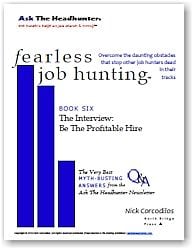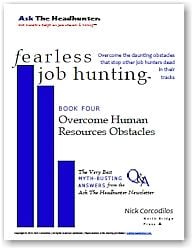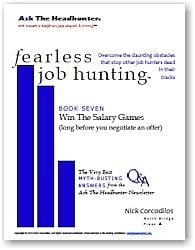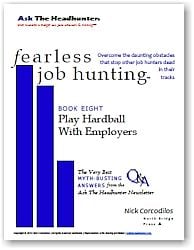In the July 22, 2014 Ask The Headhunter Newsletter, four questions yield four tips to help you overcome some of the daunting obstacles you’ll face in your job search.
- What should a job seeker always say to the employer at the end of an interview?
- What should I do about application forms that “require” my salary history?
- How can I avoid a salary cut?
- What should I do about employers that won’t give me a decision when they promise to?
Recent questions submitted by readers reinforce the idea that it isn’t the “steps” of job hunting that matter most. It’s the unexpected obstacles. In this week’s edition, I’d like to share four important tips to help you overcome obstacles in your job search. My answers in each case are excerpted from the Fearless Job Hunting PDF books. I hope these tips give you an edge!
 From Fearless Job Hunting, Book 6: Be The Profitable Hire, pp. 14-15:
From Fearless Job Hunting, Book 6: Be The Profitable Hire, pp. 14-15:
Question 1
What should a job seeker always say to the employer at the end of an interview?
When I was job hunting, I always made it clear that I wanted the job. As a hiring manager, I want to ensure that positions are filled by qualified candidates who I know, undisputedly, want the job. Can you discuss the importance of this basic and obvious technique in interviewing that is often overlooked? That is, the applicant must always say to the potential employer, “I want this job.”
Tip 1: Learn to say “I want this job”
There’s a story I tell in my first book about a talented sales executive who interviewed for a job and failed to get the offer. I asked him whether he closed the interview by saying he wanted the job.
He argued with me that making such an explicit statement is awkward and that it suggests the candidate “has no class.” My response: “It’s good you weren’t hired. Failure to say you want the job shows you don’t have enough interest in working for the employer.”
“Of course I wanted the job!” he exclaimed. “The manager knows that! That’s why I’m interviewing!”
No, the manager doesn’t know that. Not unless you tell him. Interesting, isn’t it, how unacceptable some think it is to make an explicit commitment, when that’s exactly what an another person needs to hear.
 From Fearless Job Hunting, Book 4: Overcome Human Resources Obstacles, pp. 11-12:
From Fearless Job Hunting, Book 4: Overcome Human Resources Obstacles, pp. 11-12:
Question 2
What should I do about application forms that “require” my salary history?
Some companies I recently applied to have established online application forms that include the infamous salary question. Many of these forms have the field flagged as “required,“ which prevents you from moving forward without disclosing this information. Can you give some advice on how to handle this situation?
Tip 2: Beat the application form
There may be ways around it, if you’re willing to risk getting the application screener ticked off at you. (Ever wonder who screens those apps? Ever wonder why a company lets some clerk decide who managers will and will not interview? It’s crazier than nuts.)
Such forms don’t distinguish between text and numeric entries. Try entering CONFIDENTIAL instead of a number. If a number is required, I’d use lots of 9’s to make it clear that you’re not misrepresenting your salary, but protesting the field.
You might be considered a smart aleck, and your response inappropriate. So make a frank statement about your intent elsewhere on the application. (There is usually a field for comments.) I believe it’s perfectly legitimate to politely but firmly state that your salary is confidential, and that you prefer to withhold it until a serious mutual interest develops between you and the employer. What better way to get a screener to actually pick up the phone and call you? (That’s the point of applying, right?)
 From Fearless Job Hunting, Book 7, Win The Salary Games, pp. 7-10:
From Fearless Job Hunting, Book 7, Win The Salary Games, pp. 7-10:
Question 3
How can I avoid a salary cut?
I had an excellent rapport with the CEO who interviewed me. The job is just what I was looking for. It would be a next step in my career. The salary, however, is 20% less than my last job… The CEO asked me to think it over during the weekend and call him next week if I have any ideas that could bring us closer to an agreement. He asked me not to accept the position unless I could be happy for the long haul. How can I avoid a salary cut?
Tip 3: Avoid a salary cut
It’s up to you to show the CEO how the work you will do will pay for that salary boost… Sales doesn’t mean convincing. At its best, sales means showing how you’re going to help the other guy make profit from your work, so he can pay what you’re asking. This simple idea is foreign to many people, yet it’s at the heart of any salary negotiation — and at the heart of any good business transaction.
Avoid a salary cut by showing the employer how you will help him avoid a dip in profits. Make the employer want to pay you more, by showing him how you will help him make more, too. Give the CEO some good reasons to work with you, and you may get some or all of what you want.
 From Fearless Job Hunting, Book 8: Play Hardball With Employers, pp. 15-16:
From Fearless Job Hunting, Book 8: Play Hardball With Employers, pp. 15-16:
Question 4
What should I do about employers that won’t give me a decision when they promise to?
Two weeks after my interview, I called to ask if a decision had been made. The HR person said the job was not filled, and that I was a top candidate… I have waited another two weeks without any word. I suppose I have several options: Continue waiting, call the company again to reiterate my interest, or give up and look elsewhere. Which do you recommend? How long is it reasonable to wait “patiently” after interviewing?
Tip 4: Play hardball with slowpoke employers
Never call the personnel office to find out where things stand. After the agreed-upon deadline, call the manager. Whether you talk to the manager or get voice-mail, leave this hardball message: “I’d like to work for you, but I’m considering another job offer.” Say no more. (Note that you have not closed the door to an offer.)
If none of this yields an offer or believable timetable information, then stop investing time and emotion in this deal unless it comes back. Move on.
I know only too well how frustrating this is, and how angry it makes you. The sooner you understand that many employers are too preoccupied to care, and that you’re not going to change their behavior, the sooner you can get on with your life. If you spend your time waiting for someone to make a decision about hiring you, then you give up control of your destiny. This is me playing hardball with you: Stop calling the employer.
There aren’t any “steps” to getting hired. If there were, you’d follow them and you’d have the job you want. Getting an offer is about knowing how to overcome daunting obstacles that stop other job hunters dead in their tracks. Let’s talk about the obstacles you face in your job search!
: :

